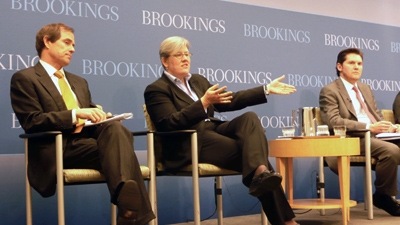Inclusive green growth is smart growth. It means putting in place policies that will encourage efficiency and removing those that don't. As the path to sustainable development, inclusive green growth will be more affordable in the long-run, create new opportunities, and take into account the true value of natural assets, the ecosystems upon which we depend.
World Bank Vice President for Sustainable Development Rachel Kyte laid out that vision of inclusive green growth during a panel discussion at the Brookings Institution on March 27 with Robert Orr, assistant secretary-general for planning and policy coordination at the United Nations, and Andres Flores Montalvo of Mexico’s Ministry of the Environment and Natural Resources.
What is important is not the label, the panelists said, but that we act.
“Over the last 20 years, economic growth has lifted more than 660 million people out of poverty and raised the income levels of millions more. However, that’s not quite enough. Growth has worked for many, but it’s not inclusive enough and it’s not working quickly enough and at risk of degrading the environment,” Kyte said. "At the same time, 1.3 billion people still don’t have access to electricity; 2.6 billion people don’t have access to sanitation; 900 million people still have no access to safe, clean drinking water. The numbers go on.”
Over the next three months, green growth for all will be increasingly in the spotlight as policymakers and activists globally prepare for United Nations Conference on Sustainable Development in Rio de Janeiro in June. The World Bank will be supporting governments to take the necessary steps to green their growth.


